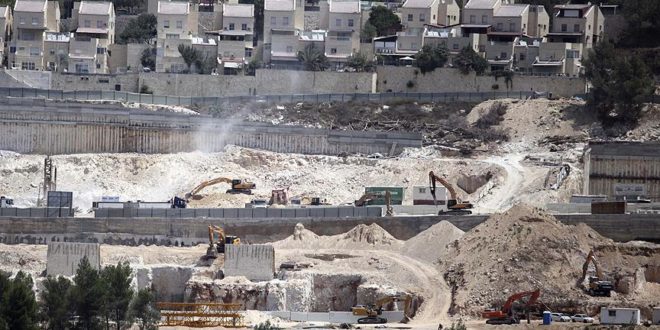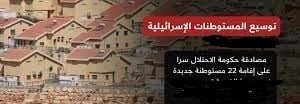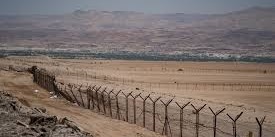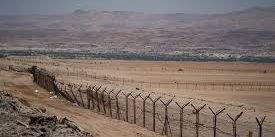By: Madeeha Al-A’raj
The National Bureau for defending land and resisting settlements ( nbprs ) stated in its latest weekly report , that in a continued defiance of International Law, resolutions of International Legitimacy, and the international community as well as the normalization agreements with the United Arab Emirates and the Kingdom of Bahrain, the Israeli Occupation Authorities recently and retroactively approved many settlement construction plans, as they approved last Thursday a building plan of 3212 new settlement units in separate parts of the occupied West Bank, a month after the signing of the agreements of normalization under US sponsorship in mid-September. According to the occupation army sources, the plan that was approved by the “Planning and Building Council at the Civil Administration” of the occupation army, is a continuation of the plan announced on Wednesday regarding approval to build 2,166 other units, bringing the total number to 5,400 settlement units.
As for the details of the approvals, as stated by the Civil Administration spokesman, the new settlement units are distributed over a number of settlements, including the construction of 500 settlement units in the settlement of Tzur Hadassah at the expense of the lands of the citizens in the village of Wadi Fukin. This is in addition to construction in the settlements Eli, Nokdim. In addition to the construction of more than 1000 units in the settlement of Beitar Illit near occupied Jerusalem, and 625 units in the settlement of Eli) deep in the West Bank on the lands of the villages and towns of Qarioot, Al-Sawiya, Al-Laban Al-Sharqiya, Sanjel and Tirmusaya, 560 units in Gilo settlement in the occupied Jerusalem, 286 in Har Barkha settlement, 181 in Einav settlement, 120 in Kedem settlement and 350 in Beit Eil settlement. They are all in the heart of the West Bank. This is the largest record in recent years of construction, and the Settlements Council Yesha said that efforts were made by settler leaders to resume construction again, stressing the need not to use construction in settlements as a bargaining paper in any peace or normalization agreements.
The NGO ‘Peace Now’, which opposes settlements, said that the settlement expansion indicates Israel’s refusal to establish a Palestinian state and strikes a blow to the hopes of achieving a broader Israeli-Arab peace. In a statement it saw that Netanyahu is moving forward with full force towards consolidating the de facto annexation of the West Bank, and that the Minister of the Army Benny Gantz, the acting prime minister in the coalition government led by Netanyahu also approve the construction plans. So, Israel is sending signals to the world about the support of the two most prominent parties in ending the concept of the two-state solution and the establishment of a Palestinian state, as the organization indicated in its statement that this construction is the highest since at least 2012 until now, it has counted the approval of building 12,159 units, indicating the possibility that the Planning Committee will meet to approve the construction of an additional number of settlement units before the end of the year.
Within the context and as part of the plan, the Civil Administration approved recently the occupation plan to many informal settlements (outposts) that were built without permission from the Israeli government. On the other hand, and in the largest operation of theft and piracy of Palestinian lands, the occupation authorities seized more than 11,000 donums in the Palestinian Valleys in favor of so-called natural reserves, where the occupation announced its seizure of 11,200 dunums for the benefit of 3 natural reserves there. Those reserves are located in Deir Hajla in Jericho, and the other is south of Al-Jiftlik near the settlement of Masawa, the third is east of Ein Al-Hilweh, and Farsiyeh in the northern Jordan Valley, in the area between the settlements of Maskyot and Rotem, which are located on the lands of citizens in the Jordan Valley. It is usually one of the ways in which the occupation authorities seize Palestinian lands, as many of the seizures fall under the heading of “natural reserves” that are later designated for settlement construction.
List of Israeli Assaults over the Last Week,Documented by the National Bureau:
Jerusalem:
- Excavations with huge machinery in several directions in Wadi Rababa to test the soil and prepare the infrastructure for the construction of an air bridge in the Wadi al-Rababa Neighborhood in the town of Silwan, south of the Al-Aqsa Mosque, under the pretext of facilitating biblical religious tourism and the arrival of extremist settlers to the Al-Buraq Wall and the Moroccan Gate, but the land owners confronted with them and prevented them from completing the drilling operations. The planned bridge is 200 meters long and 30 meters high, with a budget of NIS 1,800,000 shekels.
- Planning to evacuate the Samreen family from their home in Silwan, Jerusalem
Bethlehem:
- Attacks and harassment in more than one town, village and region, for passing plans that serve settlement expansion in the Governorate, as the adjacent areas of Khirbet Alya and Umm Rukba are subjected to a settlement attack as a number of houses were demolished, and other notices of demolition and stopping construction were handed, with the aim of emptying them of the residents and taking them over to expand the borders of the settlement of Efrat.
- Modifying the boundaries of lands in the village of Arab-Ta’amrah, east of Bethlehem, with the aim of seizing it, in favor of expanding the settlement of Taqu.
- Erecting fences in the vicinity of Jabal al-Fardis, lands in the towns of Beit Ta`mar and Za`tara, east of Bethlehem, and fencing lands they previously seized during last September, located southwest of the village, in addition to setting up four mobile homes Caravans, bringing the total number to eight.
Nablus:
- Obstructing the work of the Palestine TV crew during live coverage of settler attacks while attempting to establish a settlement outpost on the lands of Beit Dajan village, east of Nablus, and attempted to kidnap the head of the Popular Committee for the Defense of Beit Dajan Lands, Nasr Abu Jaish.
- Storming the eastern village of Laban, south of Nablus protected by occupation soldiers under the pretext of the presence of historical stones belonging to them in the village.
- Opening a settlement road in the eastern region of Asira al-Qibli lands.
- Chopping a number of electricity poles with an electric saw in Jaloud village, south of Nablus, and stole olives from lands belonging to Majd Shehadeh from Sebastia.
Jenin:
- Closing a number of agricultural roads in the towns of Zabuba and Ta’anak, west of Jenin, where they placed cement blocks on a number of lands to prevent citizens from accessing their lands.
- Seizing a bulldozer in the village of Anin, west of Jenin.
Jordan Valley:
- Storming a number of houses in the village of Ain Al-Baida in the northern Jordan Valley, and damaging their contents.
- Notifying to remove a residential tent in Khirbet Al-Farisiyah in the northern Jordan Valley.
- Expelling shepherds and herds of livestock in the areas of Al-Burj and Al-Atham in Al-Maleh in the northern Jordan Valley, while conducting military training.
 المكتب الوطني للدفاع عن الارض ومقاومة الاستيطان منظمة التحرير الفلسطينية
المكتب الوطني للدفاع عن الارض ومقاومة الاستيطان منظمة التحرير الفلسطينية




